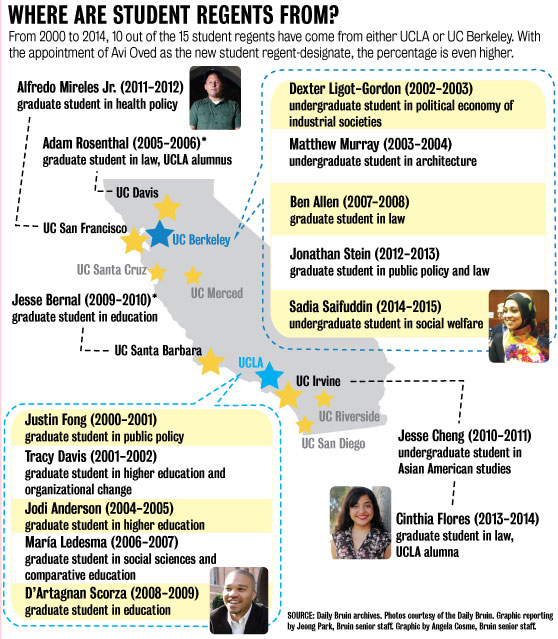Recent UC student regents hail primarily from flagship campuses

By Jeong Park
July 28, 2014 12:00 a.m.
The original version of this article contained information that was unclear and has been changed. See the bottom of the article for more information.
One student serves as the voice and the vote on the University of California Board of Regents for more than 230,000 students, but the majority of individuals who have held the job in recent years have come from just two of the 10 possible UC campuses – UCLA and UC Berkeley.
In 1974, voters amended the California Constitution to require that a UC student serve on the 26-member board. Each student regent is tasked with representing students in the UC’s policy-making processes, including decisions on student fees and admissions.
With Avi Oved, a former UCLA student government officer, as the newest student regent-designate, 11 out of 16 student regents or student regent-designates since 2000-2001 have come from either UCLA or UC Berkeley, the two flagship campuses of the University.
Graduate students have also had a higher representation in the job. Of the 16 student regents or student regent-designates since 2000-2001, 11 of them have been graduate students.
Though students and regents have said they do not consider what campus each candidate attends in their decisions, many student government leaders in the UC floated different explanations.
UC spokeswoman Brooke Converse said Monday that the specifics of the regents’ selection process are confidential and that regents would not be available to comment on them.
Some students said that they think a long application process, a lack of knowledge about the role of student regents and a doubt in the tangible power of student regents discourage students from applying.
Current regents select new student regents from three finalists nominated by the UC Student Association. Any student can be nominated as a student regent, except those currently serving as student body presidents or on the UCSA Board of Directors.
UCSA President Kareem Aref said UCSA and the regents are mainly concerned with picking a candidate who is knowledgeable about the UC’s and students’ concerns. Aref, who also sat on the UC Regents’ Special Committee to Select a Student Regent as a nonvoting member, said he thinks neither the regents nor UCSA largely consider the campus each candidate attends.
However, some students said they think the pool of student regent applicants tends to lean toward the UC’s flagship campuses even before candidates are brought forward to the regents for selection.
Bradley Bottoms, vice president of the Associated Students of UC Davis for 2013-2014, said he thinks students at UCLA and UC Berkeley often have more relevant job experience because many have served as chiefs of staff to student regents who have small offices at their home campuses. Student regents may also help recruit candidates at their home campuses, Bottoms said.
“(At flagship campuses), there is a person on the campus that can go out every day and recruit instead of going out one day,” said Bottoms, who sat on the Northern Regional Nominating Commission, which chose semifinalists for the student regent position.
Current and former student regents can also help new candidates with the application process, said Abraham Galvan, vice president of external affairs for the Associated Students of UC Riverside.
“Student regents you look up to are already from UCLA or UC Berkeley,” Galvan said. “(Students from other campuses) are less likely to develop connections with the regents.”
Aref said students at flagship campuses have more leadership opportunities working with the UC and student regents. Current Student Regent Sadia Saifuddin, for instance, worked as a chief of staff for former Student Regent Jonathan Stein, which Saifuddin said helped her to learn more about issues the UC and its students face.
Also considering the two campuses’ strong law schools and public policy programs, all of which have ranked in the top 20 of the U.S. News and World Report rankings, candidates from UCLA and UC Berkeley in general are often very strong, Aref said.
Some undergraduate students are dissuaded from applying because of the long review process for the position, Galvan said. Candidates for the student regent position must go through three rounds of interviews and reviews after filing an application. The process takes more than three months.
If a student gets the job, it also means they have to remain a UC student for another two years, which means students may have to stay an extra year even when they may already have enough units to graduate, Galvan said.
Undergraduates can also face challenges when applying because they often compete with graduate students who have more experience in the UC system, Aref said.
“It’s very hard to compete with a fifth-year doctoral student who has already had all these experiences,” Aref said.
This year, about 30 people applied for the student regent position – a record low, according to Aref. In 2012, there were about 50 applications, according to a statement the UC Office of the President released at the time.
Regents have said they try to bring different perspectives to the board through student regents, and several student government leaders in the UC system said they think it can be done better if students have the final say in who is appointed student regent.
“More students should feel like they can put their hand into this. If we can get more applicants, we get better student regents,” Aref said.
Clarification: Converse said the specifics of the selection process are confidential and regents would not be available to comment on them.

